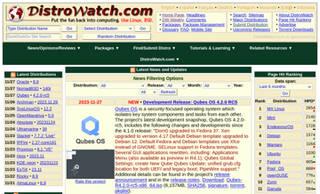Related Research Articles

Mandriva Linux is a discontinued Linux distribution developed by Mandriva S.A.

Xandros, Inc. was a software company which sold Xandros Desktop, a Linux distribution. The name Xandros was derived from the X Window System and the Greek island of Andros. Xandros was founded in May 2001 by Linux Global Partners. The company was headquartered in New York City with its development office in Ottawa, Canada.
The Desktop Linux Consortium (DLC) was a non-profit organization which aims at enhancing and promoting the use of the Linux operating system on desktop computers.
urpmi is a package management tool for installing, removing, updating and querying software packages of local or remote (networked) media. It wraps around the RPM Package Manager in the role of a smart package manager. It uses repositories and will resolve dependencies so that the user will not suffer from dependency hell that can happen when using RPM directly. It works with official sources from Mandriva or unofficial sources such as those from the Penguin Liberation Front. It has a graphical front-end: Rpmdrake.

PCLinuxOS, often shortened to PCLOS, is a rolling release Linux distribution for x86-64 computers, with KDE Plasma, MATE, and XFCE as its default user interfaces. It is a primarily FOSS operating system for personal computers aimed at ease of use.

Pardus is a Linux distribution developed with support from the government of Turkey. Pardus' main focus is office-related work including use in Turkish government agencies. Despite that, Pardus ships in several languages. Its ease of use and availability free of charge has spawned numerous communities throughout the world.

SUSE Linux Enterprise (SLE) is a Linux-based operating system developed by SUSE. It is available in two editions, suffixed with Server (SLES) for servers and mainframes, and Desktop (SLED) for workstations and desktop computers.

DistroWatch is a website which provides news, distribution pages hit rankings, and other general information about various Linux distributions as well as other free software/open source Unix-like operating systems. It now contains information on several hundred distributions and a few hundred distributions labeled as active.
SUSE Linux is a computer operating system developed by SUSE. It is built on top of the free and open-source Linux kernel and is distributed with system and application software from other open source projects. SUSE Linux is of German origin, its name being an acronym of "Software und System-Entwicklung", and it was mainly developed in Europe. The first version appeared in early 1994, making SUSE one of the oldest existing commercial distributions. It is known for its YaST configuration tool.
The commercialization of copylefted works differs from proprietary works. The economic focus tends to be on the commercialization of other scarcities, and complimentary goods rather than the free works themselves. One way to make money with copylefted works is to sell consultancy and support to the users of the work. Generally, financial profit is expected to be much lower in a business model utilising copyleft works only than in a business using proprietary works. Another way is to use the copylefted work as a commodity tool or component to provide a service or product. Android phones, for example, include the Linux kernel, which is copylefted. Unlike business models which commercialize copylefted works only, businesses which deal with proprietary products can make money by exclusive sales, single and transferable ownership, and litigation rights over the work, although some view these methods as monopolistic and unethical, such as those in the Free Software Movement and the Free Culture Movement.
Mandriva S.A. was a public software company specializing in Linux and open-source software. Its corporate headquarters was in Paris, and it had development centers in Metz, France and Curitiba, Brazil. Mandriva, S.A. was the developer and maintainer of a Linux distribution called Mandriva Linux, as well as various enterprise software products. Mandriva was a founding member of the Desktop Linux Consortium.

Criticism of desktop Linux is a history of comment on the perceived shortcomings of the Linux operating system when installed on desktop computers. These criticisms have been aimed at the plethora of issues and lack of consistency between Linux distributions, their usefulness and ease of use as desktop systems for general end users, driver support and issues with multi-media playback and audio development.

Mageia is a Linux-based operating system, distributed as free and open-source software. It was forked from the Mandriva Linux distribution. The Greek term mageía (μαγεία) means enchantment, fascination, glamour, wizardry.

SolydXK is a Dutch Linux distribution based on Debian. It aims to be simple to use, providing an environment that is stable, secure, and ideal for small businesses, non-profit organizations and home users.

OpenMandriva Lx is a general-purpose Linux distribution maintained by the OpenMandriva Association for x86 (32/64-bit) and ARM computers. It is a community-supported continuation of Mandriva Linux, which was active from 1998 until 2011. OpenMandriva is offered in a stable release edition, and a rolling release edition named Rome. It uses the RPM Package Manager and uses KDE Plasma as its default desktop environment.

ROSA Linux is a Linux operating system distribution, developed by the Russian company 'LLC NTC IT ROSA'. It is available in three different editions: ROSA Desktop Fresh, ROSA Enterprise Desktop, and ROSA Enterprise Linux Server, with the latter two aiming at commercial users. Its desktop computer editions come bundled with closed-source software such as Adobe Flash Player, multimedia codecs, and Steam.
Koozali SME server is a Linux distribution based on Red Hat Enterprise Linux and can act a server-only or server and Gateway. Core features include internet services such as HTTP, FTP or email servers and Firewall. It is also geared towards the deployment of local network utilities like file servers, print servers and anti-virus filters. An intuitive web interface allows administrators to monitor, deploy and maintain services.

Linux Caixa Mágica, sometimes abbreviated as Linux CM or LCM, is a discontinued Portuguese Linux distribution based on Ubuntu. It was maintained by the company Caixa Mágica Software and its target market were companies, individuals, schools and public administration in Portugal. It is a free operating system suitable for desktop and server machines.
References
- ↑ Distrowatch.lafox.net Archived 2007-08-10 at archive.today
- ↑ "DistroWatch.com: Lycoris Desktop/LX". distrowatch.com. Retrieved 2023-05-09.
- ↑ "DesktopLinux.com interviews Redmond Linux CTO Joseph Cheek". Archived from the original on 2001-12-17. Retrieved 2015-10-18.
- 1 2 3 "Linux.com :: Redmond Linux: Stripped-down Linux business aims at desktop newbies". linux.com. Retrieved 2015-10-18.
- ↑ "Mandriva acquires Lycoris, boosts US presence, desktop prowess". Archived from the original on 2005-06-17. Retrieved 2015-10-18.
- ↑ "lycoris1.jpg". osnews.com. Retrieved 2015-10-18.
- ↑ "The Little Penguin That Could - TIME". time.com. Archived from the original on March 8, 2005. Retrieved 2015-10-18.